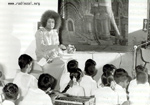| On Singing
Bhajans
Dear Reader,
We at Heart to Heart have received some queries about the
proper way of conducting bhajans. Some listeners ask,
- What is the standard format for conducting bhajans? With
Ganesha always being first... does it really matter if the
Guru bhajan is second... Or can the Mother bhajan be sung
second?
- Should all bhajans be sung on one scale.... Or can the
scale be changed with regard to the type of voice of the
singer?
- Which one is more important in keeping the beat? Is it
the instrument or the vocalist?
and so on.
We requested some of the senior students and faculty members
who conduct bhajans at Prashanthi Nilayam to give us a reply.
Here are 15 points given to us by them.
 1.
Regarding the format: What is more important is that we have
bhajans on all Deities. Rama, Krishna, Shiva, Sarvadharma
(Allah, Esu, Buddha, Zoroaster, Nanak), Mother, etc. Depending
on the place and circumstances we can sing more on some particular
name. 1.
Regarding the format: What is more important is that we have
bhajans on all Deities. Rama, Krishna, Shiva, Sarvadharma
(Allah, Esu, Buddha, Zoroaster, Nanak), Mother, etc. Depending
on the place and circumstances we can sing more on some particular
name.
2. In Sai Samithis (Centres) they sing bhajans in a particular
format. However at Prasanthi Nilayam, we do not have any particular
order, except that there should be a mix of all names. Two
bhajans on the same deity, i.e. two Krishna bhajans, or two
Rama bhajans, or two Shiva bhajans should not occur consecutively.
3. We do have an order in terms of the type of bhajans, i.e.
we sing bhajans which have a slow tempo only in the beginning
if it is a half an hour or one hour session.
4. We are expected to sing as many Namavalis (bhajans containing
only names of Gods) because they are easier to follow and
they appeal to all.
5. Only those who have a good voice and are able to sing
well should lead the bhajans. This is to ensure that the others
will get concentration and divine feelings.
6. The more the number of people attending a session the
more strict we must be on the choice of singers and instrumentalists.
That is to say, in a very small gathering, like bhajans with
family members etc., we can relax the rules on the selection
of singers...
7. There must be considerable difference in the first and
the second speed of any bhajan - double the speed if possible.
8. Clapping should be regular and single claps per cycle
in the first speed. The second speed clapping could be twice
per cycle.
9. Discipline of the singers is very important. They should
not look around here and there, or talk during bhajans. Passing
of mikes, if any, must be done so as not to disturb the others.
10. Apart from the raga (tune) and tala (beat), the singers
must be aware and feel that they are singing only for pleasing
GOD (thus sanctifying their own lives) and not for the others
gathered there.
11. Singers must do regular practice and voice culture. They
must sing only those bhajans with which they are fully confident
and which the people around can easily follow. Depending on
the following they must select known bhajans.
12. New bhajans must first be sung in smaller gatherings (or
taught) so that the followers are familiar.
13. The scale of the bhajans should be chosen in accordance
with the singer's voice. Of course one must keep in mind that
the followers should be able to follow, too. Usually, all
bhajans cannot be sung in the same scale. If instruments are
there they help in choosing the right scale, or else the scale
has to be related to the previous bhajan suitably.
14. Singers are no doubt very important and if they sing
well and with pure feelings it will uplift all others. The
instrumentalists must give good support and all in a spirit
of dedication to the Lord.
15. There must not be any time delay between ending of a
bhajan and the beginning of the next bhajan. If the instrument
is giving the lead, it must do it immediately and the singer
should start as soon as possible.
Please note that this article details the way bhajans are
conducted at Prashanthi Nilayam. This is just for the general
edification of our readers and in no way meant to force a
particular format or a set of rules on anyone. In certain
Sai Centres, certain rules and guidelines are laid down by
their respective Sai Organizations, which should be followed.
The main thing to be kept in mind is the very purpose of singing
the bhajans - communion with the Divine.
Jai Sai Ram.
|